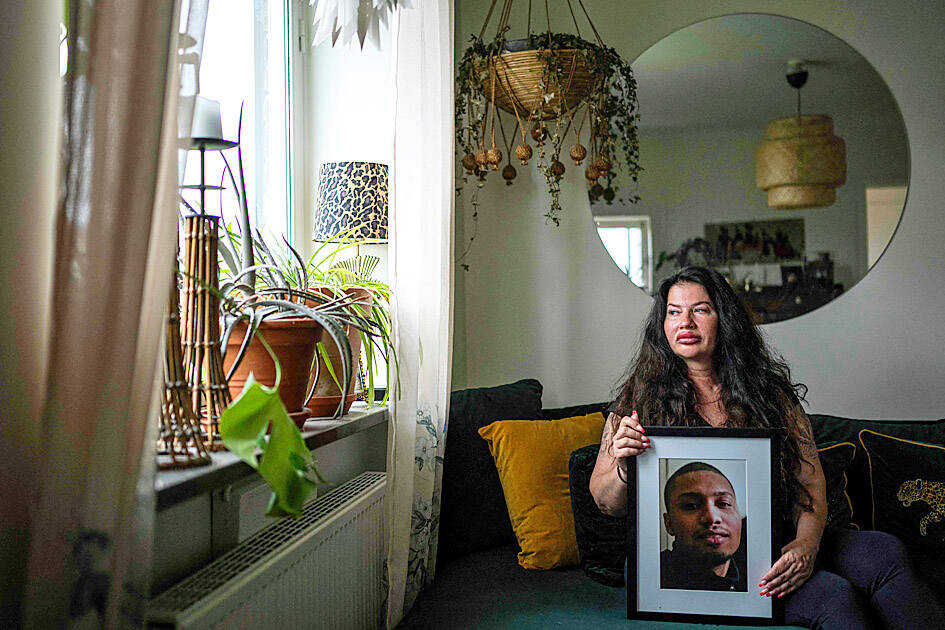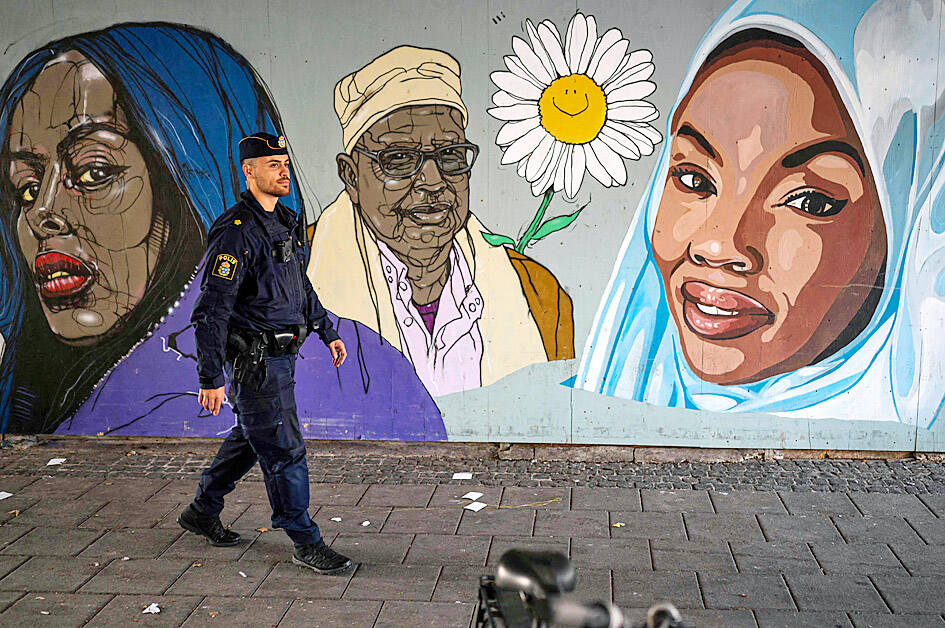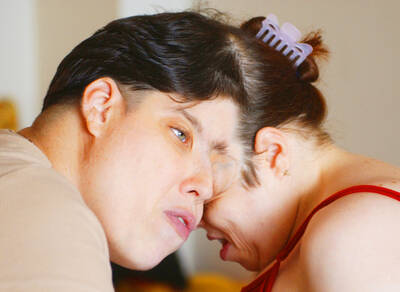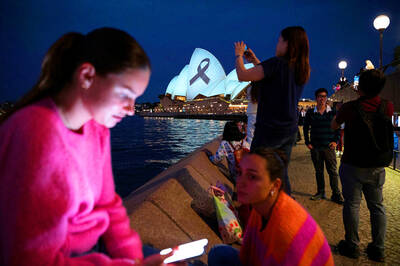Gang shootings have escalated and spread across Sweden in the past few years, with authorities struggling to contain the war-like violence that now tops voters’ concerns ahead of Sunday’s general election.
“This is my son, Marley, when he was 19 years old,” Maritha Ogilvie said, holding a framed photograph of a smiling young man, one of many that adorn the walls of her Stockholm apartment.
“He was shot in the head sitting in a car with a friend,” the 51-year-old said.

Photo: AFP
The killing, on March 24, 2015, in Varby gard, a disadvantaged concrete suburb southwest of Stockholm, has never been resolved and the case was closed 10 months later.
Murders like these are usually settlings of scores between rival gangs often controlled by immigrant clans and increasingly taking place in public places in broad daylight, police said.
The violence is primarily attributed to battles over the drug and weapons market and personal vendettas. It has escalated to the point where Sweden — one of the richest and most egalitarian countries in the world — now tops the European rankings for fatal shootings.

Photo: AFP
According to a report published last year by the Swedish National Council for Crime Prevention, among 22 countries with comparable data, only Croatia had more deadly shootings, and no other country posted a bigger increase than Sweden in the past decade.
Despite various measures introduced by the Social Democratic government to crack down on the gangs — including tougher prison sentences and boosting police resources — the number of dead and injured continues to mount.
Since Jan. 1, 48 people had been killed by firearms in Sweden — three more than the total for last year.
There are also frequent bombings of homes and vehicles, and grenade attacks.
For the first time, crime has dislodged the usual welfare state issues of healthcare and education, and is one of Swedes’ main concerns in Sunday’s election.
While the violence was once contained to locations frequented by criminals, it has now spread to public spaces, sparking concern among ordinary Swedes in a country long known as safe and peaceful.
On Aug. 19, a 31-year-old man identified as a gang leader in Sweden’s third-biggest city, Malmo, was gunned down in the Emporia shopping center, several months after the death of his brother.
A 15-year-old was arrested for the murder.
A week later, a young woman and her son were wounded by stray bullets as they played in a park in Eskilstuna, a quiet town of 67,000 people west of Stockholm.
The right-wing opposition, led by the conservative Moderates and the far-right Sweden Democrats who hope to wrest power from the Social Democrats, have vowed to restore “law and order.”
Defending the left from allegations of laxism, Swedish Prime Minister Magdalena Andersson has promised a “national offensive” against the scourge, which poses “a threat to all of Sweden.”
The escalating crime numbers are due to the emergence of “parallel societies” following “too much immigration and too little integration,” Andersson said.
Jacob Fraiman, a former gangster who now helps other criminals leave that life behind, said even he is shocked by the level of violence.
“I’m from another generation, obviously we had weapons, too, but it wasn’t often you had to shoot someone,” he said in Sodertalje, an industrial town south of Stockholm with a large immigrant population.
“You used to shoot someone in the legs. Now, they’re told to shoot in the head,” he said.
At the police station in Rinkeby, one of Stockholm’s disadvantaged suburbs, 26-year-old patrol cop Michael Cojocaru said he and his colleagues regularly encounter brutal violence reminiscent of war and seize assault weapons, grenades and explosives.
“You’ll see wounds, people who’ve been shot with AK47s, who’ve been stabbed, people who have war wounds,” he said. “It’s like a totally different society ... another type of Sweden.”
Experts attribute the escalating violence to a series of factors, including segregation, integration and economic difficulties for immigrants, and a large black market for weapons.
The recruitment of young teens into criminal gangs — who are not tried as adults if they get caught — is also a major concern.
Seven years later, Maritha Ogilvie is still trying to understand why her son was killed.
“I don’t know what happened with our society. I don’t know how they lost control over certain areas, but they did,” she said. “And it keeps on getting worse.”

Republican US lawmakers on Friday criticized US President Joe Biden’s administration after sanctioned Chinese telecoms equipment giant Huawei unveiled a laptop this week powered by an Intel artificial intelligence (AI) chip. The US placed Huawei on a trade restriction list in 2019 for contravening Iran sanctions, part of a broader effort to hobble Beijing’s technological advances. Placement on the list means the company’s suppliers have to seek a special, difficult-to-obtain license before shipping to it. One such license, issued by then-US president Donald Trump’s administration, has allowed Intel to ship central processors to Huawei for use in laptops since 2020. China hardliners

Conjoined twins Lori and George Schappell, who pursued separate careers, interests and relationships during lives that defied medical expectations, died this month in Pennsylvania, funeral home officials said. They were 62. The twins, listed by Guinness World Records as the oldest living conjoined twins, died on April 7 at the Hospital of the University of Pennsylvania, obituaries posted by Leibensperger Funeral Homes of Hamburg said. The cause of death was not detailed. “When we were born, the doctors didn’t think we’d make 30, but we proved them wrong,” Lori said in an interview when they turned 50, the Philadelphia Inquirer reported. The

RAMPAGE: A Palestinian man was left dead after dozens of Israeli settlers searching for a missing 14-year-old boy stormed a village in the Israeli-occupied West Bank US President Joe Biden on Friday said he expected Iran to attack Israel “sooner, rather than later” and warned Tehran not to proceed. Asked by reporters about his message to Iran, Biden simply said: “Don’t,” underscoring Washington’s commitment to defend Israel. “We are devoted to the defense of Israel. We will support Israel. We will help defend Israel and Iran will not succeed,” he said. Biden said he would not divulge secure information, but said his expectation was that an attack could come “sooner, rather than later.” Israel braced on Friday for an attack by Iran or its proxies as warnings grew of

A prominent Christian leader has allegedly been stabbed at the altar during a Mass yesterday in southwest Sydney. Bishop Mar Mari Emmanuel was saying Mass at Christ The Good Shepherd Church in Wakeley just after 7pm when a man approached him at the altar and allegedly stabbed toward his head multiple times. A live stream of the Mass shows the congregation swarm forward toward Emmanuel before it was cut off. The church leader gained prominence during the COVID-19 pandemic, amassing a large online following, Officers attached to Fairfield City police area command attended a location on Welcome Street, Wakeley following reports a number